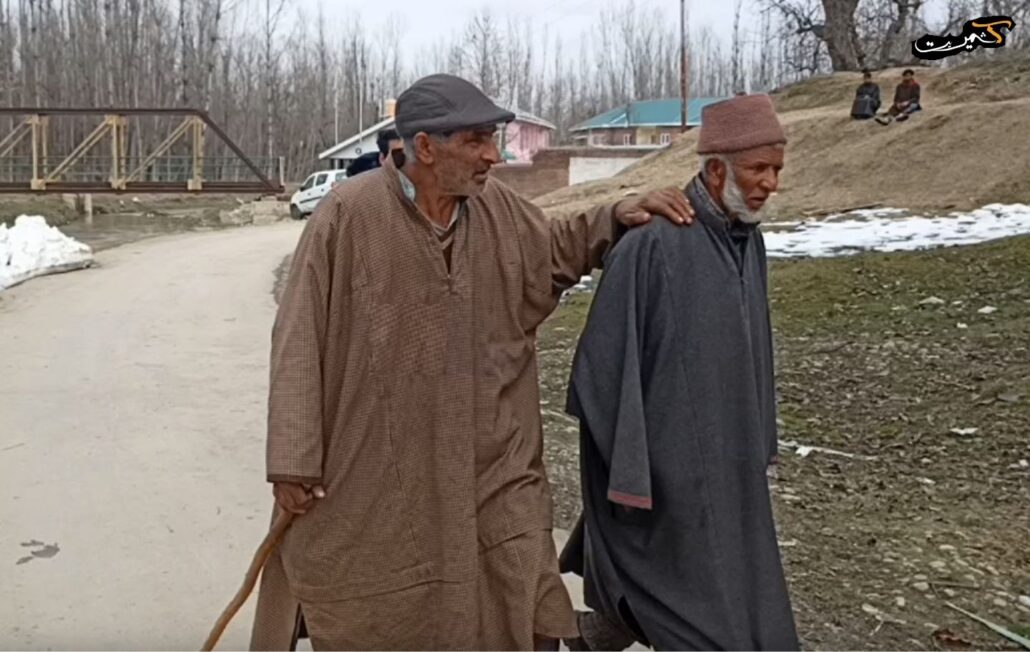
Meer Irfan
It has been two months since Anwar passed away, and winter in Shopian remains unchanged—cold, quiet, and heavy with absence. Chaman Lal, who once loved soaking in the winter sun, now rarely steps out of his house.
The warmth he once enjoyed feels distant, replaced by an emptiness that lingers in the crisp February air.
Anwar, a resident of Zainapora, passed away on December 10, 2024. His son, Ghulam Mohammed Mir, confirmed the news over the phone to The Kashmiriyat.
Four days after his passing, a local resident helped Chaman Lal visit the place he had longed to see one last time. As he stood there, his voice broke: “I have lost the friend of my life.” Those around him could not hold back their tears.
Their story, one of resilience and unwavering friendship, had been reported by The Kashmiriyat when Anwar was still alive. It was a bond that had endured through the most difficult of times.
“When the exodus happened, people told me to leave. They said, ‘Your people have left, what are you still doing here?’ But I could not leave. I had Anwar,” Chaman Lal had recalled in an earlier conversation. The 1990s had been a time of fear, a time when thousands of Kashmiri Pandits fled their homes. But Chaman Lal stayed.
“There were days when people came knocking at my door at night. I was afraid, but Anwar was always there. He would stand outside my house and say, ‘If anyone touches him, they will have to go through me first.’ That was Anwar,” Chaman Lal had said.
Their friendship was forged in those years of uncertainty, when Chaman Lal had no one left but Anwar. “There were nights when I thought I wouldn’t see the morning. But I did, because Anwar never left my side.”
Years passed, and while the violence did not entirely leave, life moved forward. Chaman Lal and Anwar grew old together, watching their village change, watching neighbors leave and new faces arrive.
But their bond remained. “We grew old, but we never stopped being friends. He would come and sit with me for hours. He knew when I was feeling lonely even before I said anything,” Chaman Lal had once shared.
Anwar, too, had spoken of their friendship with pride. “He is my brother, not by blood but by life. We have seen too much together to be anything else.”
Even in his final days, Anwar was a constant presence, taking Chaman for evening walks, helping him with daily chores, and making sure he never felt alone.
“Whenever he had to visit a doctor or some government office, he rang me up ahead of time, and I reached here,” Anwar had once said. “I promised him I would be there, no matter what.”
Fridays were the only exception—he would be in the mosque longer, and Chaman respected that. “He never let me feel abandoned,” Chaman added, his voice heavy with loss. “Every Friday, I knew he was praying, but even then, he would check on me after.”
Now, Anwar is gone, and Chaman Lal faces the long winter alone. But Ghulam Mohammed hopes to continue what his father started. He plans to open a small shop in Zainapora—not just for livelihood but to honor his father’s legacy.
“I want to be the walking stick of Chaman Lal, just like my father was,” he says.
In a land where friendships have often been tested, theirs had endured. Even in death, Anwar’s presence lingers—not just in memories but in the promise his son now carries forward.
“His passing feels like the end of an era,” Chaman told the mourners, adding, “But I know his spirit will never leave me.”




